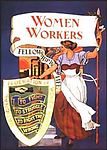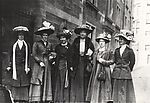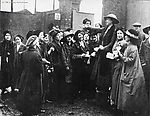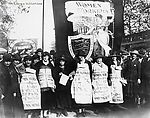 N.F.W.W. banner
N.F.W.W. banner N.F.W.W. organisers 1908. Mary Macarthur seated, Julia Varley on the left.
N.F.W.W. organisers 1908. Mary Macarthur seated, Julia Varley on the left. N.F.W.W. delegates to the Scottish Trade Union Congress. Mary Macarthur third from right.
N.F.W.W. delegates to the Scottish Trade Union Congress. Mary Macarthur third from right. Strike meeting at Morton's factory, Millwall
Strike meeting at Morton's factory, Millwall N.F.W.W. unemployment benefit demonstration 1920
N.F.W.W. unemployment benefit demonstration 1920

Mary Macarthur could see that small, scattered and poor groups of women would never be able to collect enough money to maintain a union and build up a srtike fund. Her solution to the problem was to form the National Federation of Women Workers (N.F.W.W.), a general union with all the small organisations affiliating to it.
By the end of 1906, the N.F.W.W. had 2,000 members and seventeen branches in England and Scotland. Mary was its president, exchanging positions with Gertrude Tuckwell in 1908 to become the union's general secretary.
The N.F.W.W. fought for better wages and conditions for its members. It often found that the strike was the only weapon it could use. It was involved in many strikes between 1906 and 1914.
Mary believed that unity was strength. "A Trade Union", she said, "is like a bundle of sticks. The workers are bound together and have the strength of unity....... A worker who is not in a Union is like a single stick. She can easily be broken or bent to the will of her employer......An employer can do without one worker. He cannot do without all his workers." (The Woman Worker, Autumn 1907)
After 1906 Mary and the Federation campaigned for women to join unions and for laws that would fix a minimum wage. Their efforts helped to put pressure on the Government to set up Trade Boards, including one for the chain industry, which set a minimum wage. The Cradley Heath women chainmakers went on strike in 1910 to make sure that the new rates were paid by all the chain employers. Their success led the way for minimum wages in many other trades. Membership of the N.F.W.W. rose from 2,000 to 20,000.
Mary had always believed that men and women should belong to the same unions. She supported the move to merge the N.F.W.W. with the National Union of General Workers. She believed it would be a great organisation for men and women, in which women would play an active part. Unfortunately, Mary's wishes were not fulfilled. The most militant union in the history of women's organisation became submerged in the N. U.G.M. Far from the voice of women gaining the backing of a large industrial organisation, by 1930 it had been so effectively silenced, that the National Union of General and Municipal Workers, which it had by this time become, failed to send even one woman delegate to the T.U.C. conference that year.
Rollover the captions in the box to see the available images in thumbnail format, click the caption to see the full-size image
| Reference: | 714 |
| Keywords: | |
| Archive Ref: | |
| Updated: | Thu 12 Jul 2007 - 0 |
| Interpretation written by | Barbara Harris |
| Author's organisation | |
| Organisation's website |